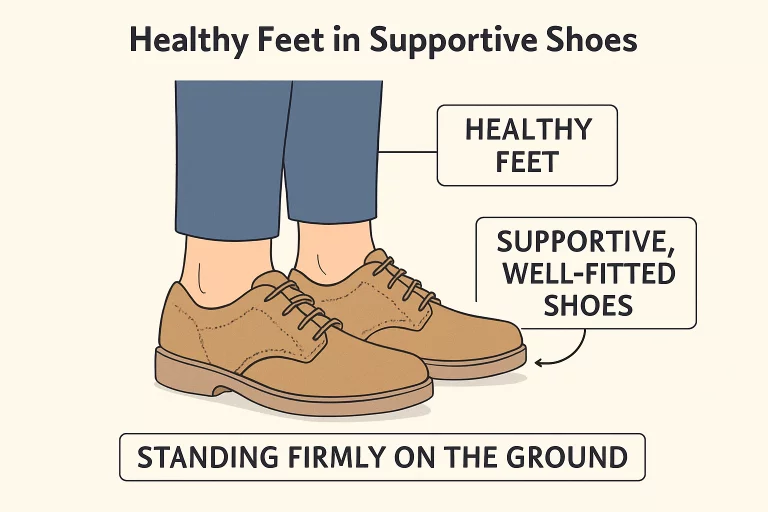Our feet are vital yet often overlooked parts of our daily lives, carrying us through countless steps, supporting our entire body weight, and enabling us to work, play, and explore. Despite their significance, feet tend to be neglected until discomfort or issues arise. Proactively caring for them is crucial not only for maintaining mobility but also for enjoying a pain-free, active lifestyle. Preventive measures can help you avoid limitations caused by sore feet, injuries, or chronic conditions. When problems develop, consulting a reputable foot clinic can significantly improve your healing, comfort, and long-term foot health. Regular care and a proactive approach are crucial for maintaining overall well-being and preventing complications that can affect your quality of life as you age. Engaging in consistent health practices, staying informed about your health status, and taking preventive measures can significantly contribute to maintaining your independence and overall well-being over the years.
Choose Proper Footwear
Wearing supportive shoes is essential for maintaining overall foot health, as ill-fitting or unsupportive footwear can lead to common foot problems, including blisters, bunions, corns, hammertoes, and plantar fasciitis. To avoid pain and deformities, it’s essential to get professionally measured at least once a year and select shoes with built-in arch support, a spacious toe box, durable soles, and adequate cushioning. Additionally, steer clear of shoes that pinch your toes or have high heels. Regularly inspect the soles, midsoles, and insoles for signs of wear and replace them when support declines. This practice helps prevent improper gait and reduces issues that can affect joints and overall body alignment, enhancing comfort.

Maintain Good Foot Hygiene
Keeping feet clean and dry is vital for healthy skin and strong protection against infections, which is why consulting a foot specialist can be beneficial. Washing daily with soap and warm water helps remove sweat, dirt, and germs, thereby reducing the risk of fungal infections. Ensuring thorough drying, especially between the toes, is key to stopping fungal growth. Regular moisturizing helps prevent dry, cracked skin on the heels and soles. However, avoid applying lotion between the toes to prevent promoting infection. Good foot hygiene not only lowers the risk of diseases but also helps you notice early signs, such as redness, swelling, sores, or changes in nail color, so that you can address issues promptly. Adopting these simple habits will help you prevent foot infections and maintain healthy feet.
Incorporate Foot Exercises
Regularly exercising your feet and ankles helps maintain overall foot health and strengthens them against injuries. Toe curls, a straightforward exercise, both stretch and strengthen small stabilizing muscles that support the arches and balance. Calf stretches, which involve a gentle bend of the front knee, enhance flexibility and relieve tension, thereby lowering the risk of heel pain or plantar fasciitis. Ankle rotations enhance mobility and improve blood circulation, thereby supporting joint health and reducing the risk of injury. Spending just a few minutes daily on targeted foot exercises can decrease fatigue, promote proper posture, and help prevent falls and sprains. These routines are a valuable investment in maintaining lifelong mobility.
Regular Foot Checks
Being proactive about foot health means not only daily care but also paying close attention to any signs of trouble. Early detection of changes can often spell the difference between a quick fix and a long, complex problem.
- Look for signs of trouble daily, including redness, bruising, swelling, cracks, blisters, or unexpected changes in the color or thickness of your nails.
- Treat minor cuts, blisters, or sore areas promptly to keep them from becoming infected, especially if you have conditions like diabetes or circulation problems, which increase vulnerability to complications.
- When in doubt, consult a professional at a trusted foot clinic. Foot specialists are trained to identify subtle symptoms that may warrant further examination and intervention.
By inspecting your feet regularly, you empower yourself to respond swiftly to issues, potentially preventing them from developing into more severe conditions that impact your comfort or independence.
When to Seek Professional Help
If you experience ongoing foot pain, persistent redness, unexplained swelling, or any possible signs of infection, such as pus or fever, it’s essential to seek expert evaluation. Foot problems that don’t resolve with basic care may signal underlying issues—from nerve disorders to structural problems—that are best managed by a foot clinic or podiatrist. Early intervention can prevent progression to more complicated conditions, saving you from unnecessary discomfort and avoiding limitations on your lifestyle. Remember, what may seem like a minor foot issue can sometimes indicate a bigger concern, so taking symptoms seriously is an important part of self-care.
Ultimately, your feet are the foundation for almost every daily activity, from walking and exercising to simply standing. By choosing quality care providers, prioritizing prevention, and maintaining a keen awareness of your foot health, you can enjoy years of comfortable movement and activity, laying the groundwork for better overall health and well-being.




Leave a Comment